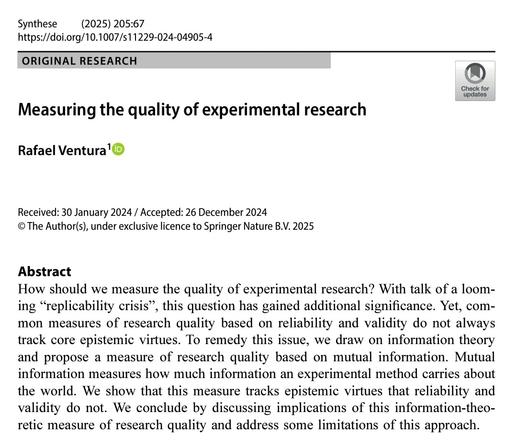As if Excel wasn’t the source of enough errors in research already #stats #metasci
RE: https://bsky.app/profile/did:plc:hakzua5btcgcfjye2yujlhos/post/3lwtmkrcqo22r
#MetaSci
Our #APC analysis preprint was cited in a Wall Street Journal story today, along with Elsevier's response.
https://www.wsj.com/business/media/scientific-journals-quality-publishers-6399fc95?st=NQ8a7Z
I've co-authored a piece calling on the open science community to lead by example in defending science. We are well positioned to combat the efforts by Trump, Musk & others that are anti-science, anti-evidence and anti-inclusion.
This is also a restatement of the importance of diversity.
Time to practice what we preach!
Read it here: https://upstream.force11.org/open-science-call-to-act/
"Reliability and validity are important properties for research methods to have. Yet, we also show that reliability and validity fall short of other epistemic virtues that are crucial to the quality of research methods" (Ventura, 2025). doi.org/10.1007/s112... #Methodology #MetaSci #PhilSci
"It should be emphasized that citation counts should not be the primary motivation for using RRs." #OpenScience #MetaSci #Methodology
See also my discussion of Van Drimmelen et al.’s work here
#MetaSci #STS #AcademicSky #Methodology 🧪
The Preregistration Prescripti...
“Theories in psychological science will always be vague, weak, and lacking in parsimony, falsifiability, and predictiveness because of the complexity and lack of generality of most social and behavioral phenomena.” #MetaSci #PhilSci #Psychology 🧪
SkyFeed's feeds seem to be back online now thanks to @redsolver.dev 🙏
#AcademicSky #PhDSky #PhilSci #MetaSci #OpenScience #SocialPsyc #CogPsyc #DevPsyc #UKHE
RE: https://bsky.app/profile/did:plc:odo2zkpujsgcxtz7ph24djkj/post/3lfzfgmijlk2j
And for my recent preprint on Popper and preregistration, see…
#MetaSci #PhilSci #HPS 🧪
RE: https://bsky.app/profile/did:plc:4jb3re5tvklsvhuc3lkerj5q/post/3l3kml4vgmw2g
SkyFeed's feeds are having issues at the moment. The owner @redsolver.dev is busy working to fix things ASAP! 🙏
#AcademicSky
#PhDSky
#Psychology
#MetaSci
#PhilSci
#SocialPsyc
#DevPsyc
#CogPsyc
#OpenScience
#UKHE
RE: https://bsky.app/profile/did:plc:odo2zkpujsgcxtz7ph24djkj/post/3leh6bkal6c2j
Arie W. Kruglanski & Sophia Moskalenko (20 Dec 2024). Social psychology in the age of uncertainty: A tale of three quandaries, European Review of Social Psychology. doi.org/10.1080/1046... #SocialPsyc #MetaSci #PhilSci 🧪
"Only 28% of sampled manuscripts [n = 4] adhered to their analysis plan or transparently disclosed all deviations." New survey of preregistration in autism studies. Open Access: doi.org/10.1177/1362... BSky author: @fsedgewick.bsky.social #MetaSci #OpenScience 🧪
“We need to scale back the maximalist attitudes, directives, and language we see about OS in science policy” #OpenScience #PhilSci #MetaSci 🧪
Generative Adversarial Collaborations "Before we aim to empirically arbitrate and ‘kill’ theories in our young field, we want them to mature through discussion, discovery, and community education." doi.org/10.1016/j.ti... Few quotes 👉🧵 #Methodology #MetaSci 🧪
Hi #MetaSci feed. I’ve removed “prereg,” “open science,” and “#openscience” as tag phrases for this feed to try to make its posts a bit more specific and relevant.
The feed will continue to pick up other metascience-related terms, with the main hashtag being #metasci (not case sensitive)!
RE: https://bsky.app/profile/did:plc:4jb3re5tvklsvhuc3lkerj5q/feed/aaaicubeccmeq
“In practice, the question that is answered true or false in confirmatory scientific research is ‘do scientists adequately understand the theoretical hypothesis and associated research methods to reliably make accurate verifiable predictions?’” dx.doi.org/10.1037/met0... #Methodology #MetaSci 🧪
Call for Papers
A topical issue of the European Journal for Philosophy of Science will consider:
“The Pursuitworthiness of Experiments Across the Sciences”
#MetaSci 🧪
RE: https://bsky.app/profile/did:plc:2uwrynll2xcbgrsx6gnb3bay/post/3lcdnyvgsrk2q


